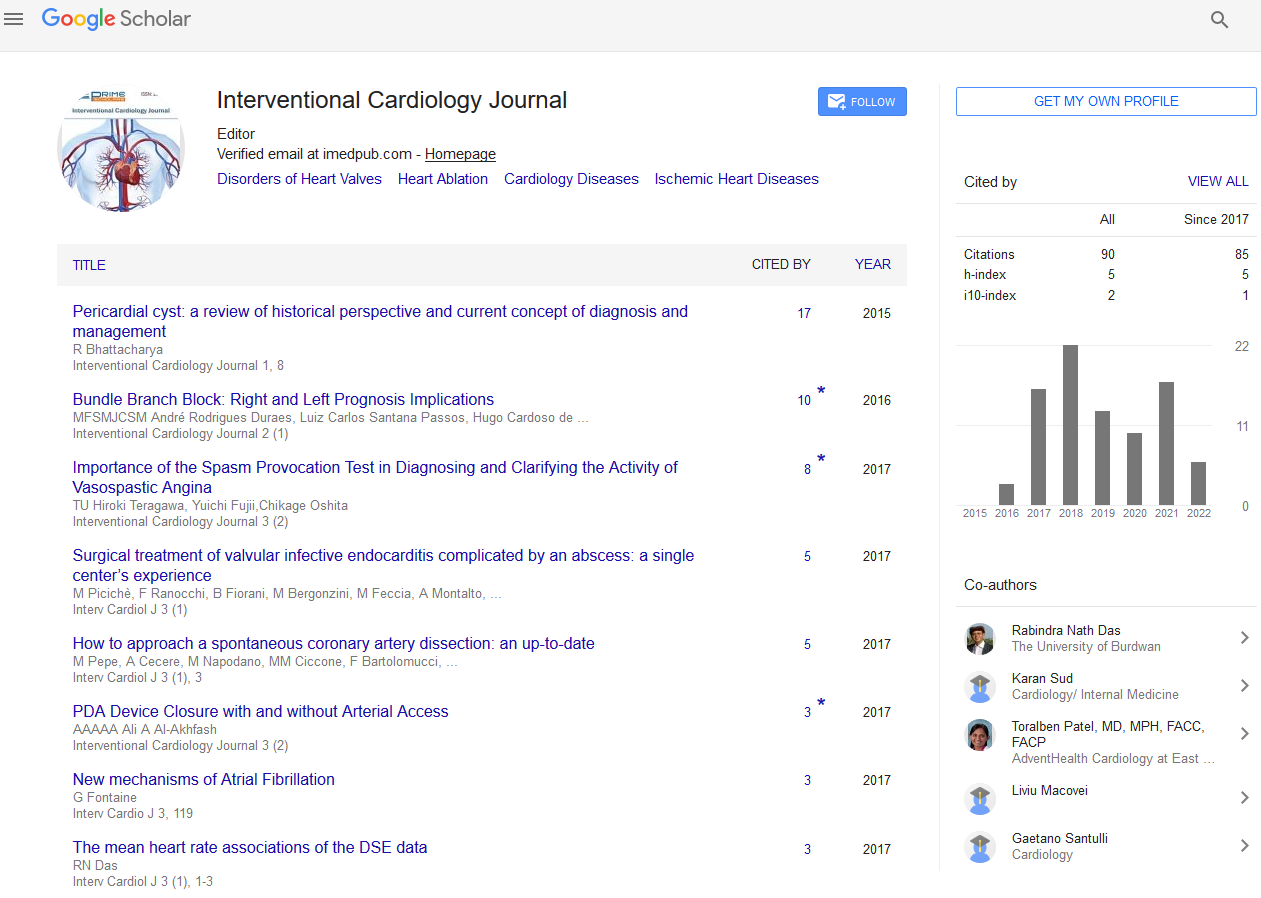Short Communication - (2023) Volume 9, Issue 4
Total Muscle Quality and Hazard of Cardiovascular Infection and All-Cause Mortality
Yong Yu*
Department of Biostatistics, Fudan University, China
*Correspondence:
Yong Yu,
Department of Biostatistics, Fudan University,
China,
Email:
Received: 29-Mar-2023, Manuscript No. IPIC-23-17361;
Editor assigned: 31-Mar-2023, Pre QC No. IPIC-23-17361 (PQ);
Reviewed: 14-Apr-2023, QC No. IPIC-23-17361;
Revised: 19-Apr-2023, Manuscript No. IPIC-23-17361 (R);
Published:
26-Apr-2023, DOI: 10.21767/2471-8157.9.4.32
Introduction
Cardiovascular diseases (CVDs) stand as the leading cause of
death worldwide, claiming millions of lives each year. These
diseases encompass a diverse range of conditions that affect
the heart and blood vessels, such as coronary artery disease,
heart failure, arrhythmias, and stroke. While the effects of CVDs
are well-documented, understanding their root causes is vital
for prevention, early intervention, and effective treatment. In
this article, we delve into the intricate web of causative factors
behind cardiovascular diseases, shedding light on genetic, lifestyle,
and environmental contributors. A significant family history
of CVDs increases the risk of developing these conditions.
Genetic variations passed down through generations can influence
factors such as cholesterol metabolism, blood pressure
regulation, and clotting tendencies. Rare genetic mutations can
lead to inherited heart conditions, such as hypertrophic cardiomyopathy,
familial hypercholesterolemia, and arrhythmogenic
right ventricular cardiomyopathy. Cardiovascular diseases often
involve multiple genetic factors, each contributing a small
risk [1-3]. Polygenic risk scores, which assess the combined
influence of multiple genetic variants, are being explored for
predicting an individual's susceptibility to CVDs.
Description
A diet high in saturated and trans fats, cholesterol, salt, and
added sugars contributes to the development of risk factors
such as obesity, high blood pressure, and high cholesterol levels.
Sedentary lifestyles lead to weight gain, reduced fitness
levels, and increased risk of conditions like hypertension and
diabetes. Tobacco use damages blood vessels, raises blood
pressure, and promotes the buildup of plaque in arteries, all
of which increase the risk of CVDs. Heavy drinking can raise
blood pressure, contribute to irregular heart rhythms, and increase
the risk of heart failure. Excess body weight, especially
around the abdomen, is linked to insulin resistance, high blood
pressure, and unfavorable cholesterol levels. Elevated blood
pressure places strain on arteries, leading to their damage and
narrowing. Over time, this can result in heart attacks, strokes,
and heart failure. Elevated levels of LDL ("bad") cholesterol
promote the accumulation of plaque in artery walls, restricting
blood flow and increasing the risk of heart attacks and strokes.
Diabetes and insulin resistance contribute to inflammation, oxidative
stress, and vascular damage, increasing the risk of heart
disease. Chronic inflammation is a key driver of atherosclerosis,
the buildup of plaque in artery walls. Inflammatory cells
contribute to plaque formation and destabilization, leading to
heart attacks. Inflammatory cytokines released in response to
infections or chronic inflammatory conditions can negatively
affect blood vessels and the heart muscle [4,5]. Exposure to air
pollutants, such as fine particulate matter, is associated with an
increased risk of heart attacks, strokes, and heart failure.
Conclusion
Cardiovascular diseases arise from a complex interplay of genetic,
lifestyle, metabolic, inflammatory, environmental, and
psychosocial factors. Understanding these causes is a critical
step toward preventing and managing these conditions. By
addressing modifiable risk factors through healthy lifestyle
choices and early intervention, and by raising awareness of the
impact of genetics, environment, and mental health, we can
pave the way for a healthier future where the burden of cardiovascular
diseases is significantly reduced. Techniques like mindfulness,
meditation, and relaxation exercises can help manage
stress and its impact on cardiovascular health. Supporting
clean air initiatives and reducing exposure to noise pollution
can contribute to heart health.
Acknowledgement
None.
Conflict Of Interest
The author’s declared that they have no conflict of interest.
References
- Almeida OP, Alfonso H, Flicker L, Hankey GJ, Norman PE (2012) Cardiovascular disease, depression and mortality: The health in men study. Am J Geriatr Psychiatry 20(5):433-440.
[Crossref] [Google Scholar] [PubMed]
- Jenkinson CM, Madeley RJ, Mitchell JR, Turner ID (1993) The influence of psychosocial factors on survival after myocardial infarction. Public Health 107(5):305-317.
[Crossref] [Google Scholar] [PubMed]
- Kim M, Kim H, Han K, Yoo J, Yang K, et al. (2022) Changes in alcohol consumption and the risk of cardiovascular diseases in patients with depression who had not consumed alcohol: A nationwide cohort study. J Psychiatr Res 155:458-464.
[Crossref] [Google Scholar] [PubMed]
- Milani RV, Lavie CJ (2007) Impact of cardiac rehabilitation on depression and its associated mortality. Am J Med 120(9):799-806.
[Crossref] [Google Scholar] [PubMed]
- Roth GA, Mensah GA, Fuster V (2020) The global burden of cardiovascular diseases and risks: A compass for global action. J Am Coll Cardiol 76(25):2980-2981.
[Crossref] [Google Scholar] [PubMed]
Citation: Yu Y (2023) Total Muscle Quality and Hazard of Cardiovascular Infection and All-cause Mortality. Interv Cardiol J. 9:32.
Copyright: © 2023 Yu Y. This is an open-access article distributed under the terms of the Creative Commons Attribution License, which permits unrestricted use, distribution, and reproduction in any medium, provided the original author and source are credited.

